DEPARTMENT OF NATURAL RESOURCES AND ENVIRONMENTAL CONTROL
Division of Water
Surface Water Discharges Section
FINAL
Amendment to Secretary's Order No.: 2018-W-0006
RE: Approving Final Regulations to Amend 7 DE Admin. Code 7204:
Regulations for Licensing Operators of Wastewater Facilities
Date of Issuance: April 13, 2018
Effective Date of the Amendment: May 11, 2018
7204 Regulations for Licensing Operators Of Wastewater Facilities
Under the authority vested in the Secretary of the Department of Natural Resources and Environmental Control ("Department" or "DNREC") pursuant to 7 Del.C. §§6006 and 6010, the following is entered as an Amendment to the Secretary's Order in the above-referenced regulatory proceeding.
Whereas, Secretary's Order No. 2018-W-0006 (the "Original Order") was issued on February 1, 2018, with an effective date of March 11, 2018; and
Whereas, pursuant to 29 Del.C. §605(a), "[n]o rule or regulation promulgated by any state agency shall become effective until the Attorney General has reviewed the rule or regulation and has informed the issuing agency in writing as to the potential of the rule or regulation to result in a taking of private property" (i.e., the "Takings Review" memorandum); and
Whereas, subsequent to the Original Order's issuance date, the Department was advised that additional time (i.e., beyond the Original Order's effective date of March 11, 2018) would be required for the Attorney General's office to provide this issuing agency with its formal Takings Review memorandum; and
Whereas, the Department has now been provided with the Attorney General's formal Takings Review memorandum, this promulgation may now be finalized with submission of the aforementioned Amendments to the State of Delaware's Register of Regulations; and
Therefore, the Original Order is hereby Amended, with the following terms and conditions:
1. The "Effective Date" of the aforementioned adoption of said Amendments by the Department shall now be May 11, 2018, as set forth in this Amendment to Order No. 2018-W-0006; and
2. The Original Order in all other respects regarding the adoption and promulgation of the revised proposed regulatory Amendments to 7 DE Admin. Code §7204, Regulations for Licensing Operators of Wastewater Facilities, stands as previously promulgated; and
3. The Department shall provide notice of this Order to the Delaware Register of Regulations for publication in its next available issue, and provide such other notice as the law and regulation require and the Department determines is appropriate.
Shawn M. Garvin
Secretary
Secretary's Order No.: 2018-W-0006
RE: Approving Final Regulations to Amend 7 DE Admin. Code 7204:
Regulations for Licensing Operators of Wastewater Facilities
Date of Issuance: February 1, 2018
Effective Date of the Amendment: March 11, 2018
Under the authority vested in the Secretary of the Department of Natural Resources and Environmental Control ("Department" or "DNREC") pursuant to 7 Del.C. §§6006 and 6010, and the following findings of fact based on the record, reasons and conclusions are entered as an Order of the Secretary in the above-referenced regulatory proceeding.
Background, Procedural History and Findings of Fact
This Order relates to proposed regulation amendments ("Amendments") to 7 DE Admin. Code 7204, Regulations for Licensing Operators of Wastewater Facilities. The Department's Division of Water, Surface Water Discharges Section, Board of Certification for Wastewater Operator Licensing, is proposing the aforementioned Amendments in order to (1) incorporate language as recommended by the regulated entities; (2) adhere to the new regulation format and numbering requirement as set forth by the State of Delaware Administrative Code Drafting and Styling Manual; (3) reorganize the structure of the Board of Certification for wastewater operators; (4) update the treatment plant classification process; and (5) modify and enhance licensing requirements. No new fees are being proposed by the Department at this time. Additionally, there are no changes or modifications proposed that will add any increased burden or costs to affected public and private entities, nor to the wastewater operating community here in Delaware.
The Department's Division of Water, Surface Water Discharges Section, commenced the regulatory development process with Start Action Notice #2016-05 (June 5, 2016). The Department published its initial proposed regulation Amendments in the July 1, 2017 Delaware Register of Regulations. The Department then held a public hearing on August 10, 2017. No members of the public attended that hearing, and no comment was received by the Department at that time. Consistent with 29 Del.C. §10118(a), the public hearing record remained open for public comment through August 25, 2017. No comment was received from the public during the post-hearing phase of this promulgation.
Hearing Officer Vest prepared a Hearing Officer's Report dated January 18, 2018 ("Report"). The Report documents the proper completion of the required regulatory amendment process, establishes the record, and recommends the adoption of the proposed Amendments as attached to the Report as Appendix "A".
Reasons and Conclusions
Based on the record developed by the Department's experts and established by the Hearing Officer's Report, I find that the proposed regulatory amendments to 7 DE Admin. Code 7204, Regulations for Licensing Operators of Wastewater Facilities, are well-supported. Therefore, the recommendations of the Hearing Officer are hereby adopted, and I direct that the proposed regulatory Amendments be promulgated as final.
I find that the Department's experts in the Division of Water, Surface Water Discharges Section, fully developed the record to support adoption of these regulatory Amendments. The adoption of these regulatory Amendments will enable the Department to incorporate language as recommended by the regulated entities, adhere to the new regulation format and numbering requirement as set forth by the State of Delaware Administrative Code Drafting and Styling Manual, reorganize the structure of the Board of Certification for wastewater operators, update the treatment plant classification process, and modify and enhance licensing requirements.
In conclusion, the following reasons and conclusions are entered:
1. The Department has the statutory basis and legal authority to act with regard to the proposed amendments to 7 DE Admin. Code 7204, Regulations for Licensing Operators of Wastewater Facilities, pursuant to 7 Del.C. Ch. 60;
2. The Department has jurisdiction under its statutory authority, pursuant to 7 Del.C. Ch. 60, to issue an Order adopting these proposed regulatory Amendments as final;
3. The Department provided adequate public notice of the initial proposed regulatory Amendments, and all proceedings associated with the same, in a manner required by the law and regulations, provided the public with an adequate opportunity to comment on the proposed regulatory amendments, including at the time of the public hearing held on August 10, 2017, and held the record open through close of business on August 25, 2017, consistent with 29 Del.C. §10118(a), in order to consider public comment on the same before making any final decision;
4. Promulgation of the proposed regulatory amendments to 7 DE Admin. Code 7204, Regulations for Licensing Operators of Wastewater Facilities, will enable the Department to (1) incorporate language as recommended by the regulated entities; (2) adhere to the new regulation format and numbering requirement as set forth by the State of Delaware Administrative Code Drafting and Styling Manual; (3) reorganize the structure of the Board of Certification for wastewater operators; (4) update the treatment plant classification process; and (5) modify and enhance licensing requirements;
5. Promulgation of the proposed regulatory amendments to 7 DE Admin. Code 7204, Regulations for Licensing Operators of Wastewater Facilities will not result in any new fees, nor any changes or modifications that will add any increased burden or costs to either affected public and private entities, or to the wastewater operating community here in Delaware;
6. The Department has reviewed these proposed regulatory Amendments in the light of the Regulatory Flexibility Act, consistent with 29 Del.C. Ch. 104, and has selected Exemption "B" regarding same, as this proposed regulation is not substantially likely to impose additional costs or burdens upon individuals and/or small businesses;
7. The Department's Hearing Officer's Report, including its established record and the recommended proposed regulatory amendments as set forth in Appendix "A", are hereby adopted to provide additional reasons and findings for this Order;
8. The Department's proposed regulatory Amendments, as published in the July 1, 2017 Delaware Register of Regulations, and as set forth in Appendix "A" as noted above, are adequately supported, are not arbitrary or capricious, and are consistent with the applicable laws and regulations. Consequently, they are approved as final regulatory Amendments, which shall go into effect ten days after their publication in the next available issue of the Delaware Register of Regulations; and
9. The Department shall submit this Order approving as final the proposed Amendments to 7 DE Admin. Code 7204, Regulations for Licensing Operators of Wastewater Facilities, to the Delaware Register of Regulations for publication in its next available issue, and provide such other notice as the law and regulation require and the Department determines is appropriate.
Shawn M. Garvin
Secretary
7204 Regulations for Licensing Operators Of Wastewater Facilities
1.1 Authority - These regulations are adopted by the Secretary of the Department of Natural Resources and Environmental Control, under and pursuant to, the authorities set forth in 7 Del.C. Ch. 60, §6023.
1.2 Purpose - The purpose of these regulations is to protect the public health and to conserve and protect the water resources of the State; to provide for the classification of all public and private (including industrial) wastewater treatment facilities; to require the examination of operators and licensing of their competency to operate, on-location, such facilities; to create a Board of Certification; and to provide for reciprocal licensing arrangements with other states.
The following words and terms, when used in this regulation, have the following meaning unless the context clearly indicates otherwise:
“Association of Boards of Certification For Operating Personnel in Water and Wastewater Utilities (ABC)” means that organization which: serves as an information center for certification activities; recommends minimum standards and guidelines for classification of Wastewater Facilities and certification of operators; aids in the establishment of reciprocity between State Programs; and assists authorities in establishing new certification programs and updating existing ones.
“Board” means the State Board of Certification (BOC) for Operators of Wastewater Treatment Facilities.
“Delaware Licensed Wastewater Operator” means an individual, who at a given time, through observation, interpretation, or decision, operates a Wastewater Treatment Facility or a segment of a system or facility.
“Department” means the Department of Natural Resources and Environmental Control.
“Direct Responsible Charge (DRC)” means on-location accountability for, and on-location performance of, active daily operation (including Technical Supervision, Administrative Supervision, or Maintenance Supervision) for a Wastewater Treatment Facility, an operating shift of a system or a facility, or a major segment of a system or facility, and is responsible for the operation and compliance of the facility according to the permit and laws of the State of Delaware.
"Multi-Plant Operator" means a Delaware Licensed Wastewater Operator who operates more than one (1) Wastewater Treatment Facility as a regular or back-up operator.
“On-Site Wastewater Disposal System” means a Wastewater Treatment Facility permitted under Delaware’s Regulations Governing the Design, Installation, and Operation of On-site Site Wastewater Treatment and Disposal Systems.
“Operate” means the actions necessary for the effective performance of a Wastewater Treatment Facility or a major segment of a system or facility.
“Person” means any individual, partnership, firm, association, joint venture, public or private corporation, trust, estate, commission, board, public or private institution, utility, cooperative, municipality or any other political subdivision of this State, any interstate body, or any other legal entity.
“Publicly Owned Treatment Works (POTW)” means a sewage treatment plant that is owned by a government agency, and are usually designed to treat domestic sewage and not industrial wastewater.
“Responsible Management Entity (RME)” is a legal entity under contract to maintain responsibility for managing and operating multiple Wastewater Treatment Facilities (See Section 4.0).
“Secretary” means the Secretary of the Department of Natural Resources and Environmental Control or his/her duly authorized designee.
“Wastewater Treatment Facility (Facilities)” means the system of pipes, structures, equipment, or processes required to treat any wastewater, and dispose of the effluent; including the treatment, handling, and disposal of residuals and biosolids related thereto.
3.1 The Board shall be appointed by the Secretary to advise and assist the Secretary in the administration of the certification program. The Board will consist of three (3) five (5) members with the Chairman being a non-Departmental member: One (1) member who is currently certified as a Delaware Licensed Wastewater Operator or who is eligible to be licensed under these regulations of an individual NPDES permitted point source discharge facility; one (1) member who is currently certified as a Delaware Licensed Wastewater Operator of a non-point source discharge facility (less than 50,000 gallons per day (gpd) permitted plant design); one (1) member representing the Department’s Surface Water Discharges Section, who shall be responsible for maintaining records; one (1) member who is currently certified as a Delaware Licensed Wastewater Operator of an industrial, commercial or other non-Publicly Owned Treatment Works facility; and one (1) member-at-large. Board members will serve The members of the Board shall serve at the discretion of the Secretary for three (3) year terms which will be staggered so that the term of not more than one (1) member two (2) members will expire in any single year.
3.2 The Board, with the consent of the Secretary, shall establish such procedures and guidelines as may be necessary for the administration of these regulations, and shall include at least the following provisions:
3.2.1 procedures for examination of applicants and renewal of licenses
3.2.2 procedures for the suspension and revocation of licenses
3.2.3 guidelines for evaluating equivalency of training and examinations conducted by recognized agencies and institutions
3.2.4 guidelines for evaluating equivalency of other certification and/or licensing programs for the purpose of according reciprocal treatment
3.2.5 procedures for establishing regularly scheduled meetings
3.2.6 procedures for evaluating continuing education requirements, in accordance with Section 8.01(d) subsection 8.1.4
3.2.7 procedures for evaluating applications to operate more than one (1) Wastewater Treatment Facility.
3.3 When taking action pursuant to these regulations, the Board may consider generally applicable criteria and guidelines developed by the Association of Boards of Certification for Operating Personnel in Water and Wastewater Utilities (ABC).
4.1 Any Wastewater Treatment Facility (except those specifically exempted by the Department), whether publicly or privately owned, used or intended for use by the public or private persons, shall be under the supervision of a Delaware Licensed Wastewater Operator(s) in Direct Responsible Charge, whose competency is licensed by the Secretary in a classification corresponding to, or higher than, the classification of the Wastewater Treatment Facility.
4.2 No person shall perform the duties of a Delaware Licensed Wastewater Operator without obtaining a Delaware Wastewater Operator’s License.
4.3 Any Wastewater Treatment Facility (except those specifically exempted by the Department), whether publicly or privately owned, used or intended for use by the public or private persons, shall at all times have available, a Delaware Licensed Wastewater Operator(s) capable of operating the Wastewater Treatment Facility.
4.4 On or before January 31 In January (no later than January 31) of each year, any owner of a Wastewater Treatment Facility whether publicly or privately owned, used or intended for use by the public or private persons, shall register with the Department and list the type of facility, the average daily flow, and the name(s) of all Delaware Licensed Wastewater Operators in Direct Responsible Charge (DRC) on a standard form provided by the Department (commonly known as a Section 4.04 Report). Any personnel changes involving the operator(s) in Direct Responsible Charge (DRC) Delaware Licensed Wastewater Operator(s), including operators in DRC, shall be reported to the Department within 30 days after the change.
4.5 On-Site Wastewater Disposal Systems with a design flow less than 2,500 gallons per day (gpd), are exempt from the provisions of these regulations. Other Wastewater Treatment Facilities may be granted exemption by the Department under Section 5.02 subsection 5.2.
4.6 All persons must be operating (or have written offer of employment) or have documented evidence of promise of employment at a Wastewater Treatment Facility in Delaware, in order to be issued a Delaware Wastewater Operators License.
5.1 The Department shall classify Wastewater Facilities which discharge into other wastewater systems, or to receiving bodies of water, or on land surface or subsurface. The classification shall consider the skill, knowledge, and experience required of an operator a Delaware Licensed Wastewater Operator; and shall be in accordance with the criteria hereby established.
5.2 Classification of Wastewater Treatment Facilities: Wastewater Facilities shall be classified in one (1) of four (4) classes. These classifications shall be made in accordance with the Point System established in accordance with the “State Board of Certification Point System Classification of Wastewater Treatment Facilities” (included as Table 1 of these regulations), and the range of points for each class of facility as shown below:
Class I 11 - 30 Points
Class II 31 - 55 Points
Class III 56 - 75 Points
Class IV 76 Points or greater
Wastewater Treatment Facilities other than those with on-site wastewater disposal systems, scoring fifteen (15) points or less, shall be exempt from the requirements of Section 4.01 subsection 4.1 of these regulations, and the owner shall be so notified by the Department. Wastewater Treatment Facilities with on-site wastewater disposal systems only, scoring ten (10) points or less, shall be exempt from the requirements of these regulations (unless otherwise required by the Department), and the owner shall be so notified by the Department.
5.3 Any Wastewater Treatment Facility may be classified in a group class other than indicated by the general criteria after determination by the Secretary. The Secretary may consider special features of design, characteristics or conditions of flow, or use of the receiving waters or combination of such conditions. The owner of the facility Wastewater Treatment Facility shall be given due notice of the Secretary’s tentative determinations, and any comments shall be considered before making the final determination.
5.4 The classification of any Wastewater Treatment Facility may be changed at the discretion of the Secretary by reason of changes in condition or circumstances on which the original classification was predicated. Due notice of any such change shall be given to the owner of the Wastewater Treatment Facility.
6.1 Applicants for Licensing shall be evaluated by the Board as to education, experience, and knowledge. Further, applicants may be required to give evidence of good character, dependability, interest in work, and other pertinent characteristics in relation to responsible operations. Applicants must pass the required written examination Any person seeking a license under this Section shall submit a complete application to the Department, on a standard form provided by the Department, pay the non-refundable application fee and must have passed the required written examination within the previous three (3) years, unless the Board determines that an alternate examination format is necessary, or when applying for a “Temporary License”. Licenses issued pursuant to this Section are not transferrable and shall be issued for two (2) years.
6.2 In evaluating an applicant’s qualifications, the Board will be guided by the following:
6.2.1 Experience requiring technical knowledge, and whether or not Direct Responsible Charge (DRC) was included. In large plants where responsibility is divided, operators of important divisions may be credited with having Direct Responsible Charge, as long as the DRC designation appears on the annual Section 4.4 submission.
6.2.2 Experience, to be acceptable, must be the result of satisfactory accomplishment of work. Evaluation may be based on reports of the employers, or by state and local agencies having appropriate responsibilities for supervising systems and plants.
6.2.3 Partial credit may be given for operating experience in maintenance, laboratories, or other work involving water or wastewater facilities.
6.2.4 Where applicable, education may be substituted for a portion of operating experience requirements as specified below:
6.2.4.1 Where education or training is substituted for operating experience, it shall not exceed an amount which would reduce the requirement of actual operating experience to less than one year for Class I, or less than two years actual operating experience for Classes II, III, and IV.
6.2.4.2 Education applied to the operating experience requirement cannot also be applied to the education requirement.
6.2.4.3 College Level education in engineering or allied subjects, or equivalent, as approved by the Board, may be substituted on a year for year basis for operating experience (any Wastewater Facility Classification).
6.2.4.4 Specialized operator training courses, correspondence courses, Seminars, workshops, etc., may be substituted for operating experience on a case by case basis; and the equivalency will be determined by the Board.
6.2.5 Where applicable, operating experience may be substituted for educational requirements as specified below:
6.2.5.1 Operating experience applied to educational requirement may not also be applied to the operating experience requirement.
6.2.5.2 One year of Direct Responsible Charge operating experience may be substituted on a year-for-year basis for one year of college level education.
6.2.6 Substitutions for formal education may be made as follows:
6.2.6.1 Specialized operator training courses, correspondence courses, seminars, workshops, etc., may be substituted for formal education on a case by case basis; and the equivalency will be determined by the Board.
6.2.6.2 An acceptable High School Equivalency Certificate (GED) may be used to substitute for a High School Diploma.
6.2.7 Additionally, the Board may be guided by special circumstances, if appropriate.
6.3 Wastewater Operators - Four (4) Classes of operators are hereby established. The qualifications are intended to relate, as nearly as possible, to the corresponding classifications for Wastewater Facilities.
6.3.1 Class IV
6.3.1.1 A college degree or completion of four (4) years in a standard curriculum in engineering or allied subjects, plus
6.3.1.2 Four (4) years of acceptable operating experience in Wastewater Facilities of Class III or higher; two years of which must have been in a position of Direct Responsible Charge (DRC).
6.3.2 Class III
6.3.2.1 High School Diploma and two (2) years of approved college level education in engineering or allied subjects, plus
6.3.2.2 Four (4) years of acceptable operating experience in Wastewater Facilities of Class II or higher; two years of which must have been in a position of Direct Responsible Charge (DRC).
6.3.3 Class II
6.3.3.1 High School Diploma, plus
6.3.3.2 Three (3) years of acceptable operating experience in Wastewater Facilities of Class I or higher.
6.3.4 Class I
6.3.4.1 High School Diploma, plus
6.3.4.2 One (1) year of acceptable operating experience.
6.2 Delaware Licensed Wastewater Operators - Four (4) Classes of operators are hereby established. The qualifications are intended to relate, as nearly as possible, to the corresponding classifications for Wastewater Treatment Facilities.
6.2.1 Level IV
6.2.1.1 A Bachelor's Degree in science or engineering from an accredited college or university, or equivalent credit hours in any other curriculum as approved by the Board and
6.2.1.2 Four (4) years of acceptable operating experience in Wastewater Treatment Facilities of Class III or higher; two (2) years of which must have been in a position of DRC.
6.2.2 Level III
6.2.2.1 An Associate's Degree in science or engineering from an accredited college or university, or equivalent credit hours in any other curriculum as approved by the Board, and
6.2.2.2 Four (4) years of acceptable operating experience in Wastewater Treatment Facilities of Class II or higher; two (2) years of which must have been in a position of DRC.
6.2.3 Level II
6.2.3.1 High School Diploma or equivalent and
6.2.3.2 Three (3) years of acceptable operating experience in Wastewater Treatment Facilities of Class I or higher.
6.2.4 Level I
6.2.4.1 High School Diploma or equivalent and
6.2.4.2 One (1) year of acceptable operating experience in a Wastewater Treatment Facility.
6.4 6.3 Specialty License - where a Wastewater Treatment Facility is of a highly unusual character, requiring skills and techniques other than those indicated by the general criteria, the Board may, with the consent of the Secretary, provide a Specialty License to an operator. Such Specialty License shall only be valid for operating the specific Wastewater Treatment Facility for which it is issued. The requirements for a Specialty License shall be determined by the Board on a case-by-case basis.
6.4 In evaluating an applicant’s qualifications, the Board will be guided by the following:
6.4.1 Experience requiring technical knowledge, and whether or not Direct Responsible Charge (DRC) was included. In large plants where responsibility is divided, operators of important divisions may be credited with having DRC, as long as the DRC designation appears on the annual Section 4.04 Form submission.
6.4.2 Experience, to be acceptable, must be the result of satisfactory accomplishment of work. Evaluation may be based on reports of the employers, or by state and local agencies having appropriate responsibilities for supervising systems and facilities.
6.4.3 Partial credit may be given for operating experience in maintenance, laboratories, or other work involving water or Wastewater Treatment Facilities.
6.4.4 Where applicable, education may be substituted for a portion of operating experience requirements as specified below:
6.4.4.1 Where education or training is substituted for operating experience, it shall not exceed an amount which would reduce the requirement of actual operating experience to less than one year for Level I, or less than two years actual operating experience for Levels II, III, and IV.
6.4.4.2 Education applied to the operating experience requirement cannot also be applied to the education requirement.
6.4.4.3 College Level education as approved by the Board, may be substituted year-for-year for operating experience (any Wastewater Treatment Facility Classification). College level education cannot be substituted for DRC experience at any Level.
6.4.4.4 Specialized Delaware Licensed Wastewater Operator training courses, correspondence courses, Seminars, workshops, etc., may be substituted for operating experience on a case by case basis; and the equivalency will be determined by the Board.
6.4.5 Where applicable, operating experience may be substituted for educational requirements as specified below:
6.4.5.1 Operating experience applied to educational requirement may not be applied to the operating experience requirement.
6.4.5.2 One (1) year of DRC operating experience may be substituted year-for-year for one (1) year of college level education.
6.4.6 Substitutions for formal education may be made as follows:
6.4.6.1 Specialized operator training courses, correspondence courses, seminars, workshops, etc., may be substituted for formal education on a case by case basis; and the equivalency will be determined by the Board.
6.4.7 Additionally, the Board may be guided by special circumstances, if appropriate.
7.1 The Board, or its authorized designee, shall prepare written examinations to be used in determining knowledge, ability, and judgment of the operators applicant. Any person wishing to take the examination shall submit a completed application to the Department, on standard form provided by the Department, and pay the non-refundable fee no later than 14 calendar days prior to the examination, or as provided by the Board.
7.2 Examinations shall be held at places and times as set by the Board, with a suitable method of advance announcement made by the Board. Examinations shall be conducted at least semi-annually.
7.3 Examinations shall be written, unless the Board determines that an alternate format is necessary. All examinations will be graded by the Board, or by others designated by the Board, and the applicant notified of the outcome. Papers Examinations will not be returned to the applicant. However, a method will be provided to review the results with a member of the Board or its authorized designee on request by the applicant. Examination results are valid for three (3) years from the date of the examination.
7.4 Separate examinations shall be prepared to cover each class Level of operator, as established in Section 6.3 subsection 6.2.
7.5 Any person who has failed the written examination for a particular Delaware wastewater operator class level on three (3) two (2) consecutive occasions, shall then must satisfactorily complete an approved educational examination review course prior to again being considered allowed to take that particular class level of written examination again.
8.1 Issuance of a License
8.1.1 Upon satisfactory fulfillment of the requirements provided herein, and based on the recommendation of the Board, the Secretary may issue a suitable license to the applicant. This license will indicate the class level for which the Delaware wastewater operator has qualified.
8.1.2 A license may be issued, without examination, in a comparable classification, to any person who holds a current valid certificate or license in any jurisdiction, if in the judgment of the Board, the requirements under which the person’s certification or license was issued, are of a standard not lower than that specified by these regulations.
8.1.3 A license shall be renewable every two (2) years unless revoked for cause, replaced by one of a higher grade level, or invalidated under subsection 8.1.4 below. Operator-In-Training and Temporary License renewals must be approved by the Board.
8.1.4 An applicant for a license renewal shall submit with the renewal application, a complete application to the Department, on a standard form provided by the Department, pay the non-refundable application fee, and provide proof that the applicant has in the preceding two years, attended or satisfactorily completed a minimum of twenty (20) classroom, seminar, or workshop hours, relating hours of approved training, of which: a minimum of ten (10) hours directly related to Wastewater Treatment Facility operations or maintenance, and a maximum of ten (10) hours indirectly related training that are sponsored by recognized government, educational, or industrial groups, including equipment manufacturers approved by the Board. Failure to do so shall be grounds for invalidation. This requirement applies to all Level licenses, including Operator-In-Training Licenses and Temporary Licenses.
8.1.4.1 The Board will maintain and make available a report of approved/denied continuing education training courses. Approved courses will be reflected as directly or indirectly related to Wastewater Treatment Facility operations or maintenance.
8.1.4.2 Duplication of directly related courses in consecutive renewal periods will be denied.
8.1.4.3 Hours for approved on-line courses will be given for actual time of courses as indicated on the certificate of completion.
8.1.4.4 Delaware Licensed Wastewater Operators who teach an approved continuing education training course will receive the advertised hours for the course.
8.1.5 An operator A Delaware Licensed Wastewater Operator whose license is invalidated, per subsection 8.1.4 above may be issued re-issued a new license of like classification level, provided: appropriate proof of competency is presented to the Board. Successful completion of a written examination shall be required if the license has been invalidated for two (2) or more years.
8.1.5.1 Less than two (2) years from date of invalidation, the Wastewater Operator meets the requirements of subsection 8.1.4 above with the addition of a non-refundable late fee, (the license shall be issued on the date of approval); or
8.1.5.2 Greater than two (2) years from date of invalidation, the Wastewater Operator shows appropriate proof of competency (i.e. operating experience) by submitting a complete application to the Department, on a standard form provided by the Department, pay the non-refundable application fee and provide proof of successful completion of a written examination within the previous three (3) years.
8.1.6 Operator-In-Training License - An applicant who desires to become licensed and does not meet the experience or educational requirements may, with the approval of the Board, receive an Operator-In-Training (OIT) license, pending fulfillment of these requirements, providing provided the appropriate examination has been successfully passed within the previous three (3) years. A holder of an OIT license may, only with the recommendation of the Board be allowed to be in Direct Responsible Charge DRC (in accordance with Section 4.1 4.0) of a Wastewater Treatment Facility on a temporary basis, until the requirements are met; up to a maximum period of two years.
8.1.7 Emergency License - An emergency license may be issued Based on the recommendation of the Board, the Secretary may issue an Emergency License, when it is demonstrated to the satisfaction of the Secretary, that the owner is unable to hire a licensed operator Delaware Licensed Wastewater Operator in spite of good faith efforts. The applicant for an Emergency License shall meet specific requirements as set forth by the Board. Such licenses may be issued with special conditions or requirements deemed necessary to protect the public health and the water resources of the State. An emergency license shall be valid only for that plant facility or system for a period of one (1) year, and may be renewed for a maximum of one (1) additional year, when extreme extenuating circumstances are shown and concurred with by the Board.
8.1.8 Temporary Level I OIT License - Based on the recommendation of the Board, the Secretary may issue a Temporary License to an applicant who desires to become licensed and does not meet the experience or educational requirements, and has not successfully passed an appropriate examination within the previous three (3) years. Upon passing the State examination, and/or fulfillment of the educational requirement, applicant is eligible for the appropriate Level I License. In order to be considered for a Temporary Level I OIT License, the applicant:
8.1.8.1 Must be employed (or have documented evidence of promise of employment) as a Wastewater Operator in Delaware.
8.1.8.2 Must, at all times, work only under the immediate direction of a Delaware Licensed Wastewater Operator.
8.1.8.3 Must pass the Delaware Wastewater Operator State Examination within two (2) years of issuance of the Temporary License.
8.1.8.4 A Temporary Level I OIT License is valid for two (2) years, and may only be extended with Board approval.
8.2 Suspension and Revocation of License - The Secretary may suspend or revoke the license of an operator a Delaware Licensed Wastewater Operator, after considering the recommendation of the Board, when it is found that the operator Delaware Licensed Wastewater Operator has practiced fraud or deception; that reasonable care, judgment, or the application of knowledge or ability, was not used in the performance of the operator’s Delaware Licensed Wastewater Operator's duties; or that the operator Delaware Licensed Wastewater Operator is incompetent or unable to perform duties properly. The Board shall act in accordance with the procedures established under Section 3.2.2 of these regulations, and shall hold a hearing before making its recommendations.
8.3 Additional Persons Licensed as DRC - The Secretary may determine, due to the size of plant the facility, shift operation, or other influencing factors, that more than one (1) operator shall be required to be in Direct Responsible Charge DRC at a given facility.
8.4 Additional Wastewater Facilities
8.4.1 Application may be made to the Secretary to operate more than one Wastewater Treatment Facility, and must include justification and capabilities. The Board will evaluate the application in accordance with the procedures “Approval for a Wastewater Operator to Operate More Than One (1) Wastewater Treatment Facility” established under Section 3.2.7 in Table 2 of these regulations.
8.4.2 Any person considered in Direct Responsible Charge DRC of more than one (1) Wastewater Treatment Facility may be required to be licensed in a classification level higher than the classification of those facilities in the operator’s charge. The degree level of operator classification a Delaware Wastewater Operator’s license may be further increased depending upon the total number of facilities under the responsible charge DRC of the operator Delaware Licensed Wastewater Operator. The Board will recommend, with the consent of the Secretary, the degree of classification level of the Delaware Wastewater Operator’s license in accordance with these factors.
9.1 The fee schedule for wastewater operator Delaware Licensed Wastewater Operator applications, examinations, and licenses, shall be established by the General Assembly.
10.1 It shall be unlawful:
10.1.1 To operate any Wastewater Treatment Facility (except those exempted under provisions of these regulations) unless the person(s) in Direct Responsible Charge DRC is (are) duly licensed under the provisions of these regulations; and
10.1.2 For any person to routinely perform the duties of an operator a Delaware Licensed Wastewater Operator without being duly licensed under the provisions of these regulations.
11.1 Any person who knowingly and willfully violates any provision of these regulations shall be subject to enforcement and penalties under 7 Del.C. §6005.
12.1 Certification or licensing of operators by any State, as determined by the Secretary, which accepts certifications made or certification requirements determined to be substantially equivalent to the requirements of these regulations or any rules promulgated hereunder, shall be recognized as valid and sufficient within the purview of these regulations.
12.2 In making determination pursuant to subsection 12.1 of this section, the Secretary shall consult with the Board, and may consider any generally applicable criteria and guidelines developed by the Association of Boards of Certification for Operating Personnel in Water and Wastewater Utilities (ABC).
13.1 The provisions of these regulations are intended to supersede existing regulations of this State insofar as they relate to the matters included in these regulations.
14.1 If any part of these regulations, or the application of any part thereof, is held invalid or unconstitutional, the application of such part to other persons or circumstances and the remainder of these regulations shall not be affected thereby, and shall be deemed valid and effective.
15.1 Division of Water Resources, Wastewater Board of Certification Department of Natural Resources and Environmental Control
Department of Natural Resources and Environmental Control
State Board of Certification for Operators of Wastewater Treatment Facilities
Division of Water
89 Kings Highway
Dover, DE 19901
Telephone: 302-739-5731 (302) 739-9946
TABLE 1
POINT CLASSIFICATION OF WASTEWATER TREATMENT FACILITIES
Definitions:
Activated Sludge: A secondary (biological) wastewater treatment process which utilizes micro-organisms suspended by aeration in an aerobic environment followed by clarification. Some common examples are: Conventional, Extended Aeration, Intermittent Cycle Extended Aeration System (ICEAS), Contact Stabilization, Oxidation Ditches, Sequential Batch Reactor (SBR), and Membrane Bioreactor (MBR).
Aeration: The process of adding air to water. Air can be added to water by passing air through water or passing water through air.
Biological Nutrient Removal (BNR): The biological removal of nitrogen and phosphorus from wastewater.
Biological or Chemical/Biological Advanced Waste Treatment: The advanced treatment of wastewater for nutrient removal, including nitrification, denitrification, or phosphorus removal, utilizing biological or chemical processes or a combination thereof. If the Wastewater Treatment Facility is designed to nitrify based solely on detention time in an extended aeration system, only the points for nitrification by designed extended aeration, should be given.
Chemical Addition/Pretreatment: The addition of a chemical to wastewater, at an application point for the purposes of adjusting pH or alkalinity, improving solids removal, dechlorinating, removing odors, providing nutrients, or otherwise enhancing treatment, excluding chlorination for disinfection of effluent and the addition of enzymes or any process included in the Tertiary Chemical/Physical Processes. The capability to add a chemical at different application points for the same purpose, should be rated as one (1) application; the capability to add a chemical(s) to dual units, should be rated as one (1) application; and the capability to add a chemical at different application points for different purposes, should be rated as separate applications.
Chemical/Physical Advanced Treatment Following Secondary Treatment: The use of chemical or physical advanced treatment processes following (or in conjunction with) a secondary treatment process. This would include processes such as carbon adsorption, air stripping, chemical coagulation, and precipitation, etc.
Chemical/Physical Advanced Treatment Without Secondary Treatment: The use of chemical or physical advanced treatment processes without the use of a secondary treatment process. This would include processes such as carbon adsorption, air stripping, chemical coagulation, and precipitation, etc.
Dissolved Air Flotation (DAF)/Dissolved Nitrogen Flotation (DNF): Process of solids removal where dissolved air is added to the treatment unit from the bottom of the basin, and the air raises suspended particles to the top of the water, where the particles are removed by skimming.
Enhanced Nutrient Removal (ENR): Refines the Biological Nutrient Removal (BNR) process and removes total nitrogen to levels as low as 3 mg/L and total phosphorus to 0.3 mg/L or less.
Filtration: The advanced treatment of wastewater for removal of solids by sand or other media or mixed media filtration.
Fixed-Film Reactor: Biofiltration by trickling filters or rotating biological contactors, followed by secondary clarification.
Land Treatment and Disposal (surface or subsurface): The ultimate treatment and disposal of the effluent onto the surface of the ground by rapid infiltration or rotary distributor or by spray irrigation. Subsurface treatment and disposal would be accomplished by infiltration gallery, injection, or gravity or pressurized drain field.
Mechanical Dewatering: The removal of water from sludge by any of the following processes, and including the addition of polymers, vacuum filtration; frame, belt or plate filter presses; centrifuge; or Rotary Press.
Mechanical Post-Aeration: The introduction of air into the effluent by mechanical means such as diffused or mechanical aeration. Cascade aeration would not be assigned points.
Mechanical Thickening: To reduce the liquid content of the sludge by a thickening process and including the additional of polymers in any of the following common examples: Dissolved Air Flotation (DAF) or Gravity Belt Thickeners (GBT).
Membrane Bioreactor (MBR): A combination of two basic processes – biological degradation and membrane separation – into a single process where suspended solids and microorganisms responsible for biodegradation are separated from the treated water by membrane filtration unit.
Odor Control: Specific devices for reducing odors. Does not include “masking” devices.
Oil and Water Separator: Specific devices for the separation of oil from wastewater.
P.F.R.P.: Processes to “further” reduce pathogens in bioresiduals, prior to further use. Now currently known as Class A sludge which limits coliform bacteria to a single count of less than one (1) thousand per gram by analysis.
pH Adjustment: The alteration of the pH of the raw wastewater or pre-finished wastewater by mechanical or chemical procedures, to enhance the performance of the treatment process.
Population Equivalent (P.E.): Means the population computed by relating the total daily weight (W lbs.) of Biochemical Oxygen Demand (BOD) to the daily per capita BOD of 0.17 lb. as shown below:
P.E. = W/0.17
10,000 (per capita)
P.S.R.P.: Processes to “significantly” reduce pathogens in bioresiduals, prior to further use. Now currently known as Class B sludge which limits coliform bacteria to an average count of less than two (2) million per gram by analysis.
Rapid Infiltration Basin (RIB): means earthen basins designed for a repetitive cycle of flooding, infiltration/percolation, and drying of treated wastewater.
Reverse Osmosis (R.O.): Passage of wastewater from a concentrated solution through a semipermeable membrane, to finished water with the application of pressure.
SCADA Instrumentation: The Supervisory Control and Data Acquisition system is a computer-based system that monitors and controls remote wastewater treatment facility sites. A SCADA master control is typically located in a dedicated control center or treatment plant control room. Remote sites are equipped with remote terminal units to gather information and issue controls from the master station.
Secondary Treatment: A type of biological treatment of wastewater followed by secondary clarifiers.
Sequential Batch Reactor (S.B.R.): An activated sludge treatment process that takes place in a single vessel, cycling through stages.
Solids Composting: Biosolids treatment process whereby solids are combined with other organic matter and operated to promote thermophilic decomposition of wastes which may then be used as a soil conditioner or fertilizer.
Solids Stabilization: The processes to oxidize or reduce the organic matter in the sludge, to a more stable form. These processes reduce pathogens or reduce the volatile organic chemicals, and thereby reduce the potential for odor. These processes would include lime (or similar) treatment and thermal conditioning.
Spray Irrigation: A method for disposing of treated wastewater by spraying it on the land surface.
Subsurface Disposal: See definition for Land Treatment and Disposal (surface or subsurface) above.
Tertiary Treatment: Those processes commonly used after secondary treatment to meet water reuse requirements.
Facility: Date:
Address: Classifier:
Permit No. Facility Representative:
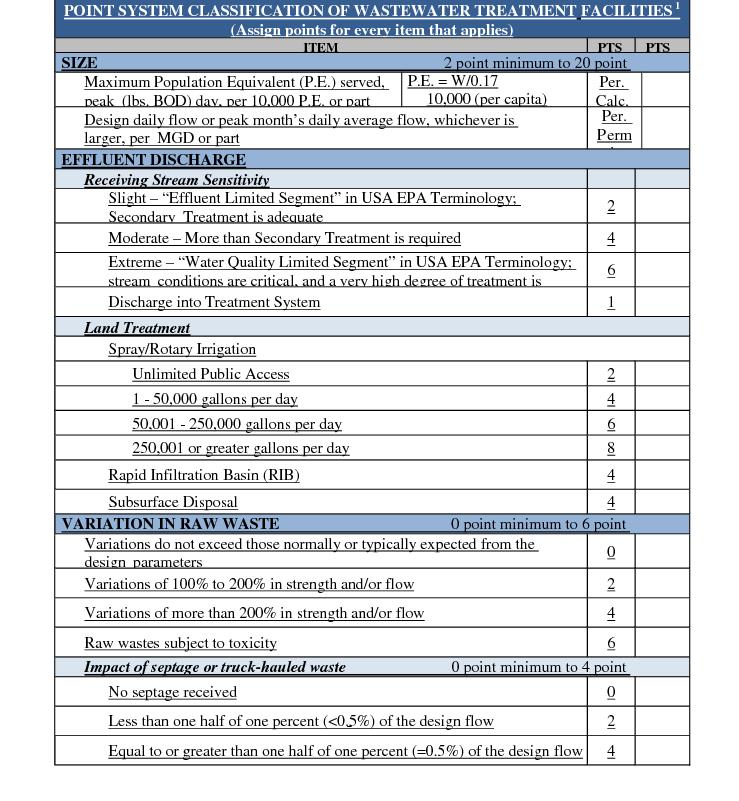
1 Any technologies outside of those listed will be evaluated for point equivalencies.
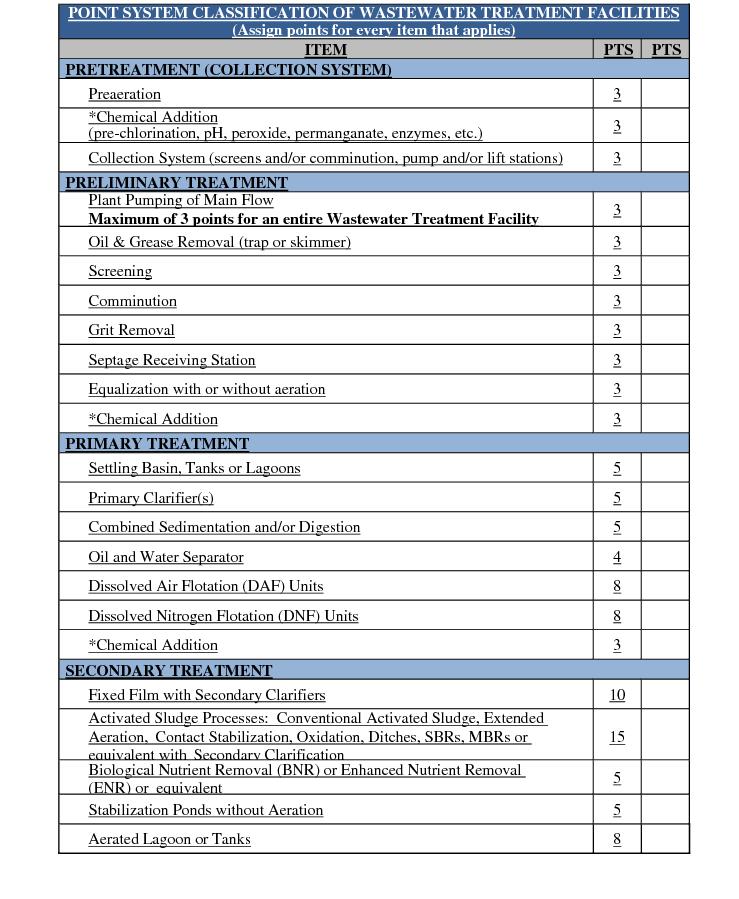
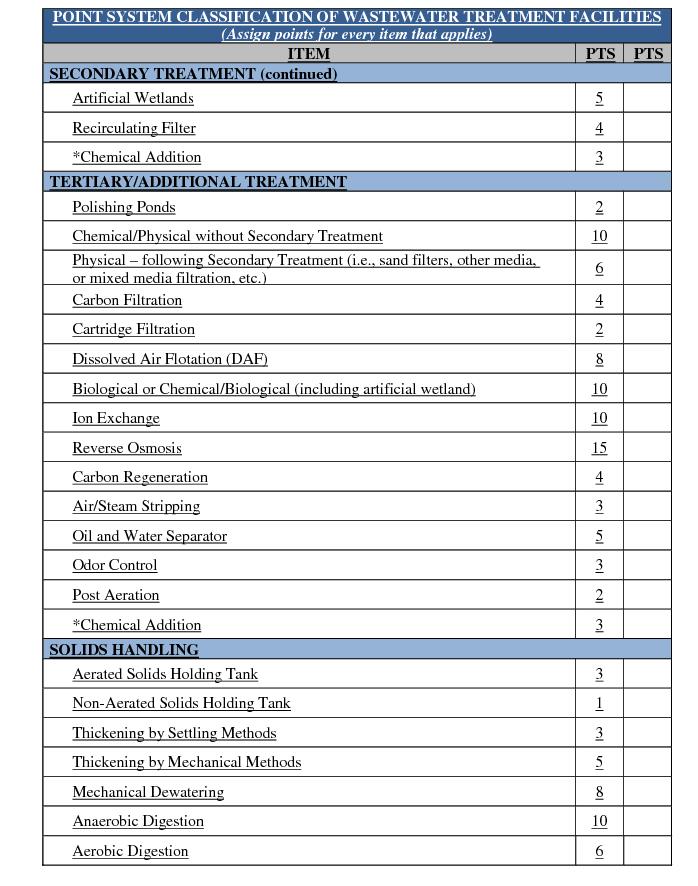
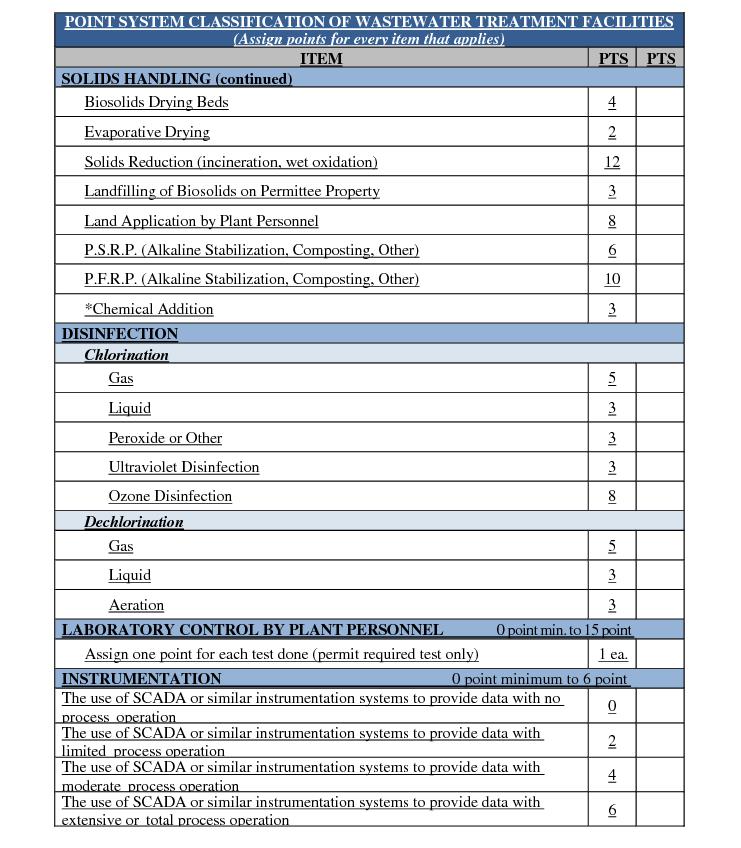
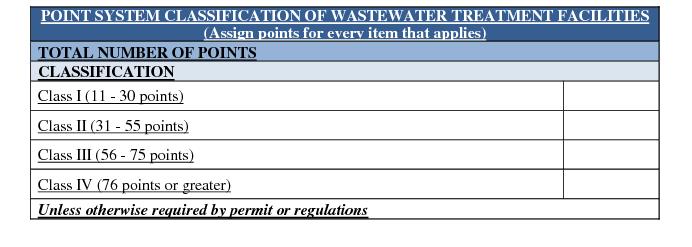
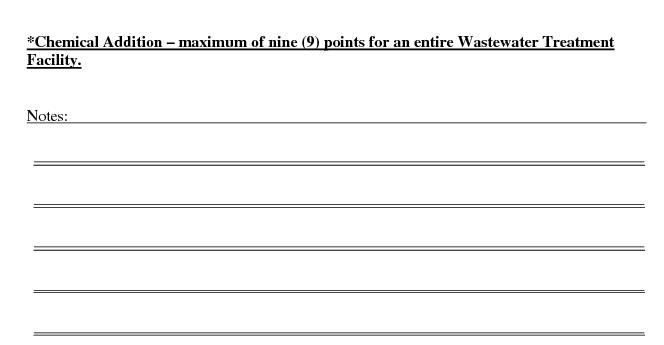
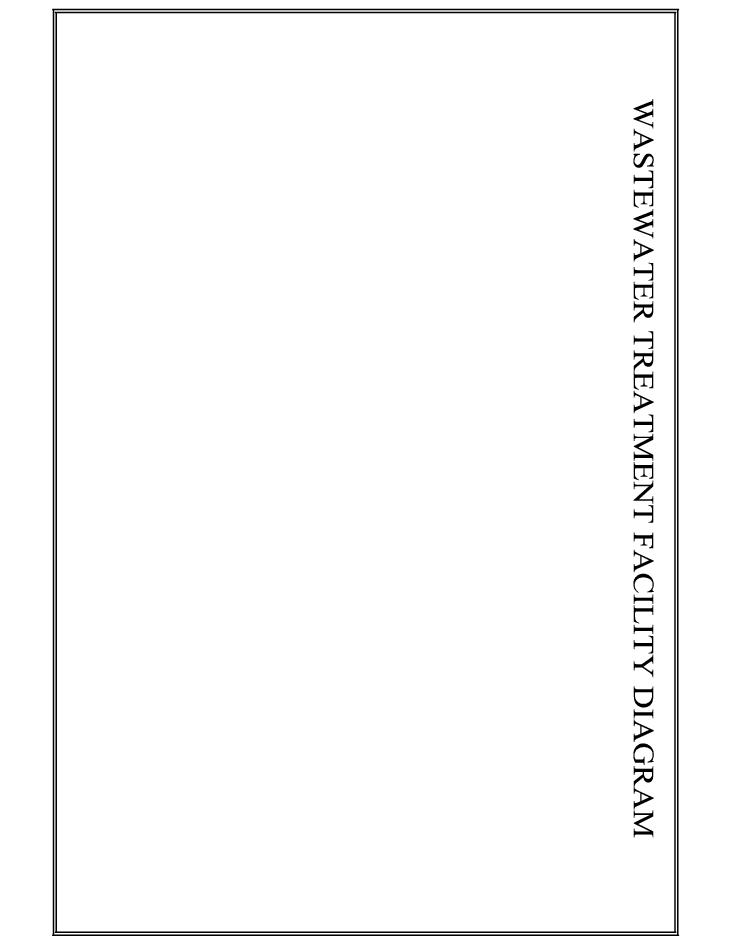

Where the type of Wastewater Treatment Facility is determined by permitted plant design average flow as shown in the following table:
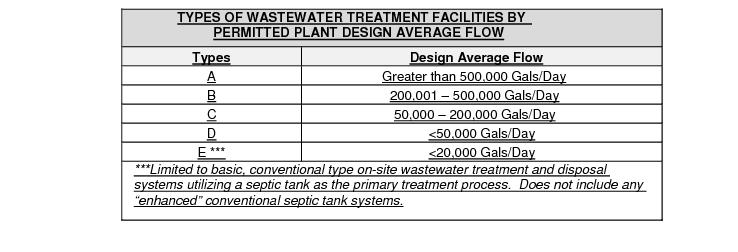
The Delaware Licensed Wastewater Operator may recommend, for the Department’s consideration, which one (1) of the Wastewater Treatment Facilities the Delaware Licensed Wastewater Operator would prefer to continue to operate, if approved.
3. The Delaware Licensed Wastewater Operator shall submit a schedule for operating and maintaining all Wastewater Treatment Facilities. A minimum of two (2) Wastewater Treatment Facility operation and maintenance visits per calendar week is required for the simplest of Wastewater Treatment Facilities, [except as noted in the table below]. More frequent visits may be required depending upon the operational complexity of each Wastewater Treatment Facility. In submitting the schedule, the Delaware Licensed Wastewater Operator shall note thereon that the Department shall be notified in writing with an amended schedule within five (5) calendar days of any change to the original or previously approved schedule. Failure to do so may result in revocation of the Delaware Licensed Wastewater Operator’s privilege to operate more than one (1) Wastewater Treatment Facility.
The Delaware Licensed Wastewater Operator in DRC, or a Delaware Licensed Wastewater Operator approved by the facility DRC shall visit each Wastewater Treatment Facility for which he/she is responsible at least as frequently as shown on the following table or as approved by the Department:

9. Upon receiving official authorization, the Delaware Licensed Wastewater Operator must post a copy of the authorization letter, along with a copy of his/her certificate, at each Wastewater Treatment Facility listed on the form.
4. Employees (full-time and part-time) of a RME who will be assigned to multi-plant operations must complete the following: Approval for a Delaware Licensed Wastewater Operator to Operate More Than One (1) Wastewater Treatment Facility – Employee of a Responsible Management Entity (RME). This application must be filed on the initial assignment of any employee; thereafter, any changes to assignments will be included in the RME’s required Quarterly Report to the Department.







